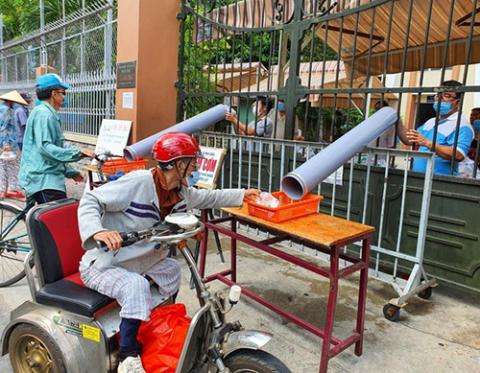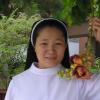
Dominican sisters prepare gifts for the homeless, the unemployed and those in need via a "free market" during the pandemic, in the Archdiocese of Ho Chi Minh City, in Vietnam. (Courtesy of Mary Nguyen Thi Phuong Lan)
The fourth wave of the COVID-19 pandemic is sweeping across most of the provinces in Vietnam, especially since the appearance of the extremely contagious delta variant. To protect its citizens, local governments have asked them to limit going outside, have closed traditional markets and some businesses, forbidden gatherings of more than two people in public places, and stopped public transportation. Many who live in quarantine or isolated places are losing jobs, lack food, and experience the stress of social distancing.
Lottery ticket sellers, street vendors and unemployed workers lack money for rent or basic commodities and meals, relying on the donations from local authorities, Catholic organizations, or volunteer groups. However, the pandemic is getting worse: The number of people infected every day is in the thousands, and we don't know when it will be controlled. So the worries of these people are intensified, since they don't know when their lives will be back to normal.
The fourth wave is also affecting the faith life of Vietnamese Catholics, especially for parishioners in some dioceses in south Vietnam such Xuan Loc, Phu Cuong, and Ho Chi Minh City. The Ho Chi Minh City Archdiocese (formerly Saigon) has the highest number of COVID-19 infected patients and deaths in the nation, and parishioners have lived in quarantine for nearly three months. There are no jobs, no money to pay for daily living expenses, and their faith life becomes separated from God and the church.
The raging epidemic has made society unstable and the economy stagnant; many families are in a miserable and precarious situation with no way out. Facing that misery, we Vietnamese Christians are bewildered by this terrible pandemic. All religious activities have been suspended for nearly three months, which has never happened in the history of the Vietnamese church. Meetings and gatherings are not allowed. The cathedral has been silent, with no religious ceremonies. With vicars and laity far apart, the community has lost connection with the church.
Through the eyes of faith, however, we are not completely pessimistic. No matter how aggressive COVID-19 is, it also has a positive side. It helps us to live more mindfully, to trust strongly in God, to live the maxim of "letting go every day," to try to practice the life of faith thoroughly, and to create many opportunities to practice charity for the love of Christ — as in the letter of James, "Faith without deeds, it is totally dead" (James 2:17).
In Vietnam, most Christians are always ready to show charity to their brothers and sisters who are facing difficulties due to the pandemic. From small groups in parishes to large communities like dioceses, religious orders, and Caritas charity organizations — all are united in their efforts to contribute to emergency causes for people living in misery, lacking food and basic necessities in this time of quarantine.
For example, Caritas of Thu Duc parish in the Archdiocese of Ho Chi Minh City organized a month of charity to distribute breakfast gifts to poor workers. At the parish gates, these gifts were transferred via a water pipe to the poor, starting at 7 a.m. with the motto "anyone who needs can get one." Additionally, Caritas also provides gifts for poor families in the parish (both Catholic and non-Catholic) like cooking oil, fish sauce, soy sauce, monosodium glutamate and rice.

Members of the Caritas charity committee of Thu Duc parish in the Archdiocese of Ho Chi Minh City in Vietnam provide breakfast to workers in need. At the parish gates, these gifts are transferred via a water pipe. (Mary Nguyen Thi Phuong Lan)
Sharing the hard life of pandemic victims, Dominican sisters of the Tam Hiep Immaculate Conception convent (Dominican sisters of the Xuan Loc Diocese, and the Archdiocese of Ho Chi Minh City) also prepare a "free market" with gifts for the poor, the homeless, the unemployed — with the motto "given if you have, you need and receive."
Besides that, Sister Mary — who is in charge of the convent — said, "Every day, the sisters also received a truckload of vegetables and fruit from donors, and then the sisters are busy to divide these kinds of different vegetables into portions for the families in the time of quarantine or the people who are isolated at home and the poor inns ... to help them overcome the difficulties in this quarantine time."
More importantly, a number of priests, religious men and women from different orders, and parishioners of the three dioceses of Xuan Loc, Phu Cuong and Ho Chi Minh City responded to the bishops' call to voluntarily participate in the prevention of the COVID-19 pandemic by going to hospitals to help or take care of the COVID-19 patients who have no relatives with them, because of the danger of disease.
Their voluntary dedication is truly meaningful and extremely valuable to the patients and to everyone, because the volunteers don't just come to serve as ordinary medical workers, but to bring God to people who are suffering from the virus and at risk of losing their life. In particular, for Christian patients, they provide the opportunity to receive God's grace from the sacraments, and receive the Eucharist — the source of eternal life, their desire in life, and especially in the hour of death.
Advertisement
We asked some of the volunteer sisters and priests how they felt when they joined in this mission, or what will they did to aid the patients in this pandemic.
Sister Anna, a volunteer belonging to the congregation of the St. Paul sisters, said, "I am very happy to represent my congregation in helping COVID patients, imitating the Virgin Mary to visit her cousin Elizabeth who brought Jesus and the joy to her cousin. I also want to bring God and consolation to the patients as in any way alleviate their difficulties or pain of their disease."
Similarity, Father Peter, a young priest who also joined the volunteers, shared, "I feel a little bit nervous and worried, but because I was chosen by God to be a priest or pastor, I also have a desire to go to the sheep, especially to the patients in the pandemic time. I don't know if I can help these patients, but at least I can be present with them to comfort and encourage them to overcome the difficulties of this disease, especially I can help those who are dying get consolation in the end of their life."
In truth, when the priests and monks join in this ministry, it is a good chance for them to live their faith by serving others. Every time we forget ourselves and serve others, we experience true joy, the joy of the one bringing the love of Christ, who has touched and carried all the pain of humanity.
In summary, we should see this pandemic as an opportunity to love. According to God's word, Christians must recognize all COVID-19 victims as "neighbors" (Luke 10: 29-37), willing to "rejoice with those who rejoice, weep with those who weep" (Romans 12:15) without knowing who they are. All people are compatriots, members of the great national and human family. Catholics are not allowed to exclude, discriminate against, or condemn anyone — infected with COVID-19 or not.




